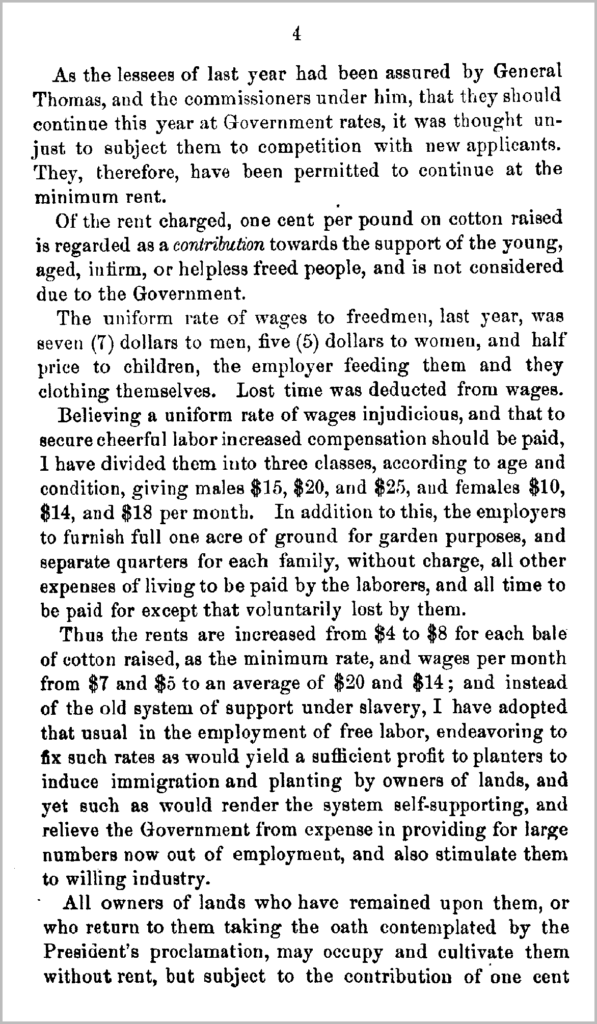Report of William P. Mellen, 1864

Report relative to leasing abandoned plantations and affairs of the freed people in first special agency
Transcript Excerpt
Sir: In compliance with the instructions of your letter of December 27, 1868, to assume the performance of the duties contemplated by the orders of the Secretary of War, in leasing abandoned lands, houses, and tenements, I proceeded down the Mississippi river, as far as Natchez, and now report my action and the result of my observation. At Memphis I prepared rules and regulations concerning the renting of abandoned plantations and the employment of freedmen, which were forwarded to you for approval. These rules provided for radical changes in the system adopted in my agency last year….
Believing a uniform rate of wages injudicious, and that to secure cheerful labor increased compensation should be paid, 1 have divided them into three classes, according to age and condition, giving males $15, $20, and $25, and females $10, $14, and $18 per month. In addition to this, the employers to furnish full one acre of ground for garden purposes, and separate quarters for each family, without charge, all other expenses of living to be paid by the laborers, and all time to be paid for except that voluntarily lost by them. Thus the rents are increased from $4 to $8 for each bale of cotton raised, as the minimum rate, and wages per month from $7 and $5 to an average of $20 and $14; and instead of the old system of support under slavery, I have adopted that usual in the employment of free labor, endeavoring to fix such rates as would yield a sufficient profit to planters to induce immigration and planting by owners of lands, and yet such as would render the system self-supporting, and relieve the Government from expense in providing for large numbers now out of employment, and also stimulate them to willing industry. All owners of lands who have remained upon them, or who return to them taking the oath contemplated by the President’s proclamation, may occupy and cultivate them without rent, but subject to the contribution of one cent 5 per pound on all cotton raised by them for the support of the helpless freedmen, and also subject to the same rules in the employment of labor as lessees of abandoned plantations. Provision is made to induce such of the freedmen as are competent, and have means or can obtain them from aid societies, or others, to cultivate small tracts of land on their own account…
I find there are in my agency about 30,000 men, women, and children, now mostly unemployed, and drawing rations from the United States for support, and the number is daily increasing. These must be supported in idleness during this year, or they may earn more than their support. 1st. By placing them all in such localities as will render them secure from personal harm, and employing them in labor for the Government, or, 2d. By sufficiently protecting the lessees and other planters who will employ them. I much prefer the latter course as likely to be productive of better effects in all their bearings. But in either case immediate action is imperatively necessary. Adequate military protection to this planting interest must be afforded at once, or the hundreds of persons now there and of others going there will abandon their contemplated work. The military forces were mostly unexpectedly withdrawn from the Mississippi by General Sherman to join in his expedition. This created a panic amongst whites and blacks, in which the former withdrew from the operations which they had commenced, or suspended action in commencing. The latter, filled with terror, came crowding to the river banks imploring protection, and many of them were temporarily removed to places of safety. More than a month has elapsed since work should have been commenced. Another month lost will end all chance of employment by lessees and other planters this year, and l throw upon Government the burden of supporting thousands.
Questions
What information does this report provide about economic conditions in the Mississippi Delta?
How did the Civil War change life for African Americans in this region?